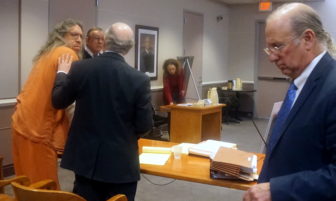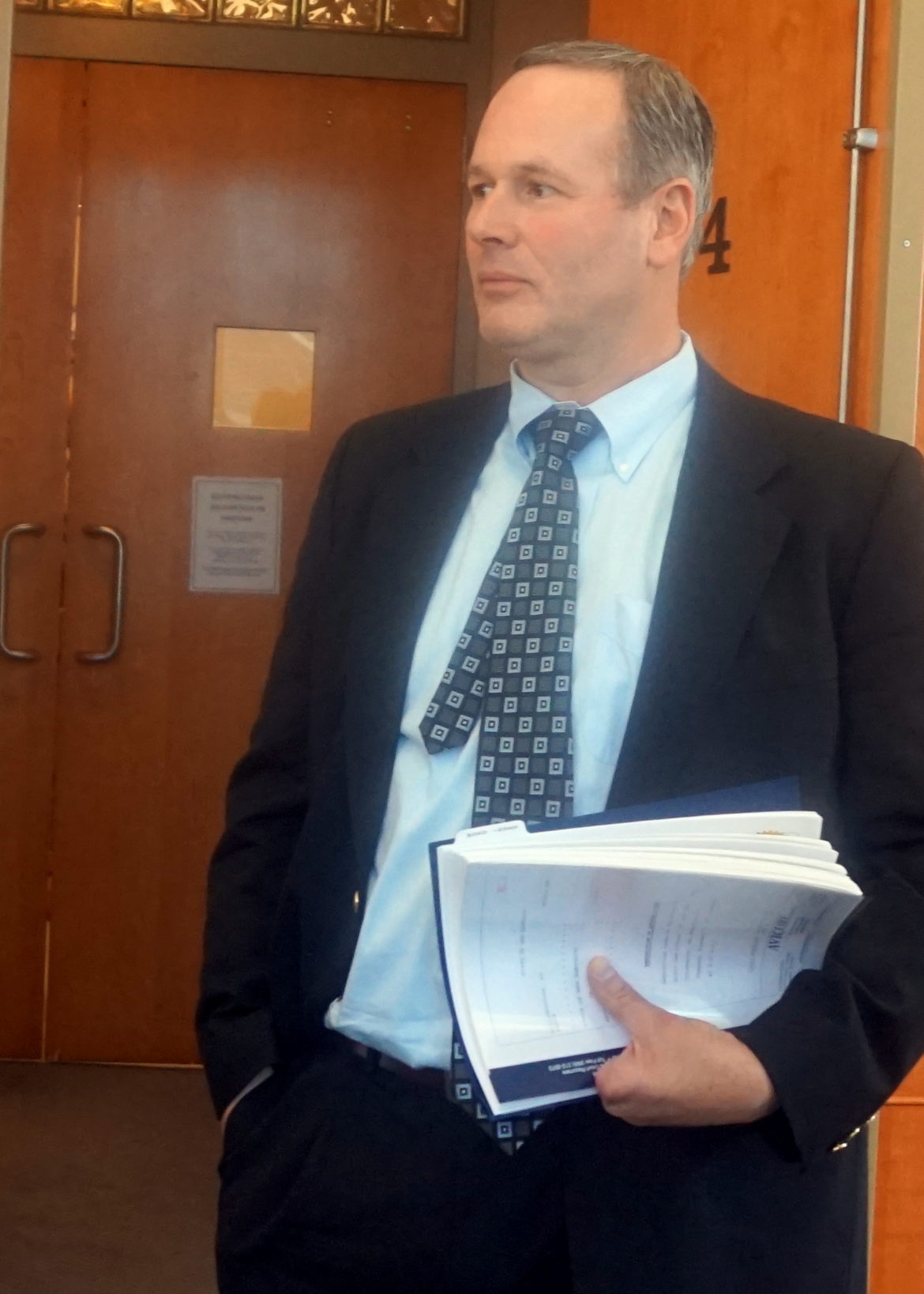
Nancy West photo
Anthony Barnaby, left, is accused of killing two women in Nashua in 1988. He is pictured with his lawyers Alan Cronheim and Mark Sisti, right, in Hillsborough County Superior Court South in Nashua.
Tony Pivero was a young Nashua patrolman in 1994 when he first locked horns with his superiors after he arrested the son of former U.S. Sen. Warren Rudman for aggravated drunk driving.
The politically powerful Rudman, a former New Hampshire attorney general, lived in Nashua when his adult son Alan Rudman was arrested there.
The charge was reduced to speeding at the last minute despite Alan Rudman’s history of drunk driving and prior involvement in a fatal accident.
What infuriated his bosses at the time was what Pivero did next. And what he has done every time he complains about the Nashua police – just as he did before providing testimony Friday in the recently revived decades-old Anthony Barnaby murder case.
“I picked up the phone and called the local newspapers,” Pivero said Friday from the witness stand in Hillsborough County Superior Court South in Nashua.
Pivero provided testimony at a suppression hearing meant to show that Nashua Police Capt. Paul Goupil threatened Barnaby before the then-21-year-old confessed decades ago while officers who were interviewing him were out of the room. When Goupil took the stand before Pivero on Friday, he adamantly denied threatening Barnaby.
Barnaby’s attorneys are seeking to have his confession thrown out. Barnaby was reportedly interviewed for 20 hours just days after the Oct. 3, 1988, murders of his upstairs neighbors, Brenda Warner and Charlene Ranstrom.
Defense Attorneys Mark Sisti and Alan Cronheim argued to suppress Barnaby’s 1988 confession as attorneys squared off during the four-day hearing last week. More testimony is expected when both sides meet again next month.
Barnaby was tried in three separate trials soon after the 1988 beating and stabbing deaths of the women, but he was released after all three juries failed to reach a unanimous verdict. Charges against his co-defendant, David Caplin, who was staying with Barnaby at the time, were dropped initially.
Barnaby and Caplin, both Canadian Micmac Indians, were rearrested in May of 2015 after being extradited from Canada when prosecutors announced they had new evidence.
Rudman backlash
For the better part of a year after Pivero spoke out about the Rudman case, newspapers ran stories that revealed Nashua police reduced charges on a disproportionate number of drunk driving arrests.
Around the same time, the New Hampshire Union Leader won a Supreme Court case forcing Nashua police to release a video of Alan Rudman being booked at police headquarters.
In testimony at last week’s hearing, this became an issue because it was the first of many complaints against the Nashua police that Pivero, who was also elected the president of the patrolman’s union, has made over the years. Prosecutors sought to show Pivero had an ax to grind as a result.
Was Pivero, who joined the Nashua police department in 1993, in hot water after speaking out publicly on the Rudman case? Attorney Sisti asked him.
“Yes, because of the negative publicity and numerous grievances I filed with the police department over the years, I was on the hot seat on a regular basis,” said Pivero, who retired after a decade on the job after a shooting that was ruled justified by the Attorney General’s Office. Pivero shot a murder suspect to death during a standoff and was later awarded a medal of valor, but testified that it was mailed to him a year after he retired.
Pivero testimony
During questioning by Sisti and cross-examination by Assistant Attorney General Patrick Queenan, Pivero said Nashua Police Capt. Paul Goupil bragged to him decades ago that he, Goupil, was largely responsible for Barnaby’s confession.
Pivero hadn’t joined the Nashua police department yet in 1988, but routinely conducted joint investigations with Nashua officers when he worked for the U.S. Department of Justice Immigration and Naturalization Service.
While waiting for detectives at the Nashua headquarters, Pivero and Goupil talked on a number of occasions, he said.
During one such conversation, Pivero said a boisterous Goupil told him about the police interrogation of Barnaby shortly after Warner and Ranstrom were murdered.
“(Goupil) made the statement that he knows how to get things done,” Pivero testified, contradicting Goupil’s testimony earlier Friday in which Goupil denied the conversation.
Goupil said on the stand he was only trying to understand this man, Barnaby, that police were interviewing when he entered the room. He insisted he never threatened Barnaby and was alone with him for only a brief period.
Interview room chat
Pivero told the court: “… they were talking about fly fishing or salmon fishing at the time and at one point in time, he (Goupil) said he had his balls in his hands and that he would cut them off.”
Pivero demonstrated with a hand gesture with one hand moving like a pair of scissors. “What he implied was very clear that he was going to cut his balls off,” Pivero said.
Pivero said he contacted Sisti in June of 2015 shortly after a conversation with his friend Frank Paison – a former Nashua police officer who ultimately obtained Barnaby’s confession. Paison died unexpectedly a week after they spoke.
Queenan objected to testimony about the conversations as hearsay, but Judge Jacalyn Colburn allowed Pivero to continue, saying his testimony would be subject to cross-examination.
Pivero went to Paison’s Merrimack home to put in a wood floor about a week before Paison died on June 19, 2015. When he arrived, Paison was on the phone.
“I was getting my tools ready and he says, ‘it looks like Barnaby and Caplin are going back for retrial.’ So I had assumed that maybe he had just received that information,” Pivero said.
Paison spoke in general about the case, according to Pivero. “What he said is, if the issue of Goupil came up he would not lie or cover up for Goupil,” Pivero told the court.
Disgruntled ex-cop?
Assistant Attorney General Queenan, who tried to paint Pivero as a disgruntled ex-cop out to embarrass the department, asked if Pivero was testifying because he didn’t like Goupil. Queenan said it was Goupil who had reduced the aggravated DWI charge against Alan Rudman to speeding in 1994.
“No they are totally different issues,” Pivero said, adding that in his opinion, both involved integrity issues.
Paison had also related to Pivero that he tried to reopen two unsolved homicide cases, but was unable to move forward because all of the physical evidence had been destroyed, Pivero said.
Destroyed evidence
A note in each case file explained that the physical evidence in the case of Kathleen Randall, 18, a Boston University co-ed whose body was found in Nashua in 1972, was gone. So, too was the physical evidence in the murder of Madlyn Crouse, 74, who was strangled to death in her Main Street apartment in 1976, Pivero told the court.
InDepthNH.org previously filed a right-to-know request in the evidence destruction matter. Documents that were released showed the Attorney General’s Office investigated Pivero’s allegation, but decided against any criminal charges because investigators couldn’t determine who ordered the destruction of the evidence.
Queenan pressed Pivero on why he complained about the Nashua police department so many times over the years even after leaving the department, and why he still attends Nashua Police Commission meetings and has an online subscription to The Telegraph of Nashua while living in Dunbarton.
“People over the years would tell me things because they knew I was a good outlet to put the information out to the media so they would know the Nashua police department isn’t as squeaky clean as it always looked to be,” Pivero said.
Queenan also pressed Pivero on discipline while at the department, but Pivero said it was usually for infractions such as publicly criticizing the department or calling a supervisor by his first name.
Queenan insisted that Pivero had also been disciplined for untruthfulness, but Pivero said the first he heard of one such finding was recently when Queenan interviewed him in preparation for last week’s suppression hearing.
“You believed the attorney general and Nashua Police Department were targeting you?” Queenan asked.
Pivero responded: “I believe there was some type of collusion that went on between the two to remove me or basically get me to leave the Nashua police department.”
Queenan also questioned Pivero about allegations he made in 2013 about John Seusing, who has since retired as chief of police in Nashua. Pivero complained that Seusing had lied to his superiors early in his career and that hadn’t been disclosed as required before a 1985 homicide trial.
Attorney General Joseph Foster determined that Seusing had in fact disclosed the lie in that one case, but a judge ruled it didn’t have to be turned over to the defendant.
Foster praised Seusing in a press release, but said the same disclosure about the lie should have been made in every case in which Seusing testified during the rest of his career. Pivero said every complaint he has filed was true even if authorities deemed them unfounded.
Unfounded doesn’t mean they didn’t happen, Pivero said. He accused the Attorney General’s Office of being selective in what they investigate and how thoroughly they dig into different allegations.
Queenan said to Pivero: “You are the kind of guy who is willing to take rumor and speculation and file formal serious complaints even if proven false or unsubstantiated and then share them with the media.”
Pivero said: “Absolutely not.”
Queenan said: “That’s what you did in the past and that’s what you’re doing now …. “You were there for 10 years and didn’t receive any promotions.”
Pivero responded: “Yeah I had a big mouth.”





